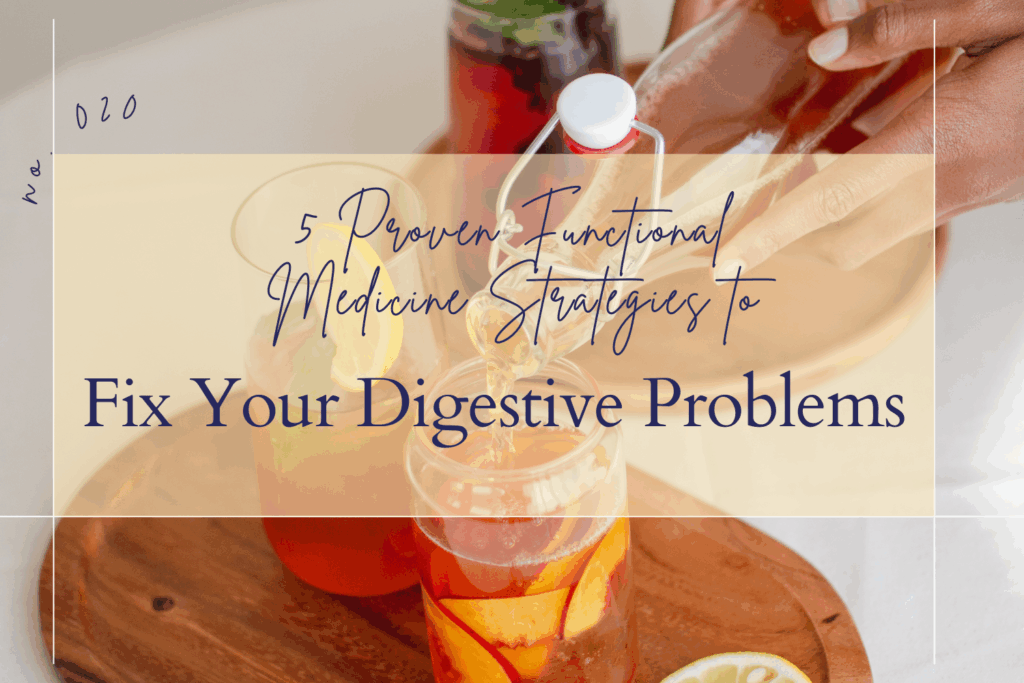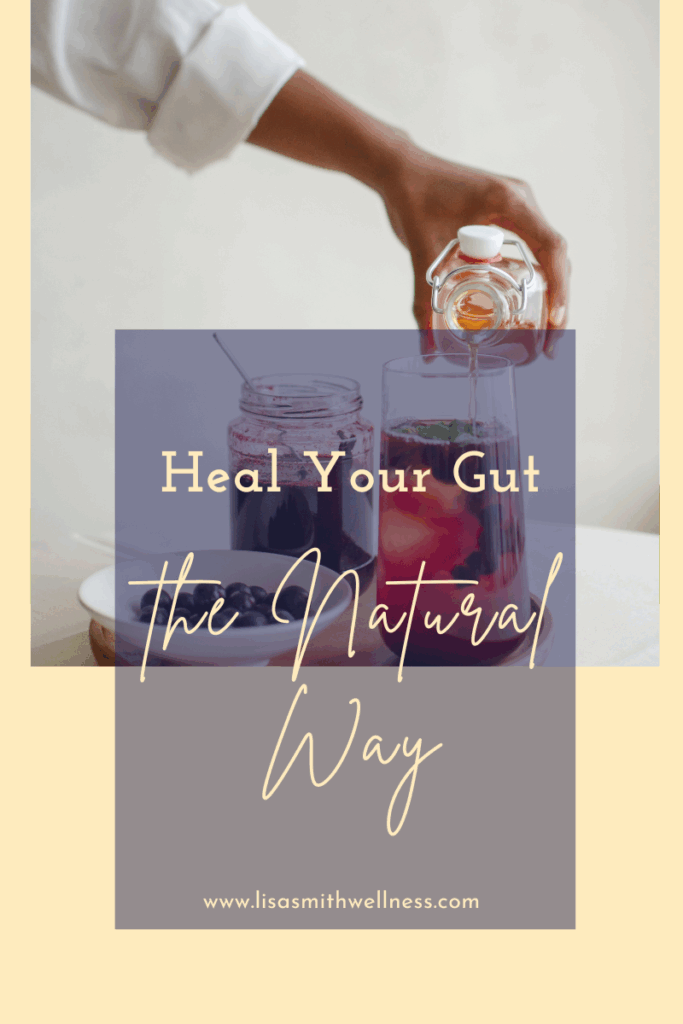Let’s be honest: nothing can derail your day quite like digestive drama. Bloating that makes you look five months pregnant, gas you pray no one notices, bathroom emergencies that force you to know the location of every restroom within a five-mile radius—it’s exhausting, frustrating, and often embarrassing.
This post contains affiliate links meaning I make a small commission at no extra cost to you. Thank you for supporting the work of Lisa Smith Wellness and the Pretty Well Podcast!

But here’s the bigger truth: your gut is not just about digestion. It’s ground zero for your energy, immunity, hormones, skin health, and even your mood. Functional medicine has been saying for years what research now confirms—poor gut health is linked to everything from autoimmune conditions and IBS to anxiety, depression, fatigue, and premature aging.
So if your gut is struggling, it’s not just about your digestion. It’s about your whole life experience.
The good news? You don’t have to accept bloating, reflux, constipation, or random stomach drama as “just how your body works.” With the right strategies, you can heal your gut, reclaim your energy, and glow from the inside out.
Here are 5 functional medicine strategies that actually work to fix your digestive problems—and bonus, they also support your skin, hormones, and overall vitality.
1. Incorporate Digestive Enzymes
Think of digestive enzymes as your gut’s first responders. Their job is to break down food into small, usable nutrients your body can actually absorb. Without enough enzymes, food sits heavy in your stomach, ferments in your small intestine, and triggers uncomfortable symptoms like bloating, belching, gas, and nutrient malabsorption.
Yes, your body naturally produces enzymes (saliva, pancreas, and stomach all pitch in), but stress, aging, and poor diet can reduce enzyme production. That’s why so many people with digestive issues notice a huge difference when they add digestive enzymes before meals.
Functional Medicine Strategy to Fix Digestion:
- Work with a practitioner to find the right blend for your needs. Some formulas focus on breaking down protein, others fat, others carbs—or a combo.
- Start small: Take enzymes before heavier meals and notice how your body responds.
- Food sources: Pineapple (bromelain) and papaya (papain) are natural enzyme boosters. Fermented foods like sauerkraut also support digestion by preloading your gut with active cultures.
When enzymes do their job, you’re not only less bloated—you’re actually absorbing vitamins, minerals, and antioxidants from food. That means more energy, stronger immunity, and skin that actually benefits from the healthy meals you’re eating.
2. Heal the Gut Lining with L-Glutamine
Your gut lining is just one cell thick. ONE. That’s all that stands between your bloodstream and everything you eat, drink, and swallow. Stress, antibiotics, NSAIDs (pain relievers), alcohol, processed foods, and chronic inflammation can weaken this delicate lining, leading to leaky gut syndrome.
When the gut barrier gets leaky, tiny food particles sneak into the bloodstream where they don’t belong. Your immune system attacks, triggering inflammation that shows up as IBS, autoimmunity, skin issues, fatigue, or even joint pain.
Enter L-glutamine. This amino acid is the gut lining’s favorite fuel. It feeds the cells of your intestines, repairs damage and helps seal those microscopic leaks. Studies show L-glutamine can reduce IBS symptoms, support healing in Crohn’s and ulcerative colitis, and promote the growth of beneficial bacteria.
Functional Medicine Strategy to Fix Digestion:
- Supplementation: 3–5 grams daily is often recommended but work with your practitioner for the right dose.
- Food sources: Bone broth, grass-fed beef, wild salmon, spinach, cabbage, parsley, and beets.
- Bonus: Glutamine isn’t just good for digestion—it also supports muscle repair, immunity, and clearer skin by calming inflammation.
Think of L-glutamine as spackle for your gut wall: it patches up damage so your system can calm down and function the way it should.
3. Prioritize Probiotics for Digestion (But Do It Smartly)
Your gut microbiome is basically its own ecosystem—trillions of bacteria, viruses, and yeast working (or sometimes fighting) to keep you healthy. The right balance helps you digest food, regulate weight, detoxify hormones, and even produce neurotransmitters like serotonin and dopamine (yep, your gut literally influences your mood).
But antibiotics, processed foods, sugar, alcohol, stress, and toxins throw off that balance, creating dysbiosis—too many harmful microbes, not enough beneficial ones. Cue: bloating, IBS, skin flare-ups, food sensitivities, and fatigue.
Probiotics are one of the best ways to restore balance. But here’s the catch: not all probiotics are created equal.
Functional Medicine Strategy to Fix Digestion:
- Skip the cheap grocery store brands. Look for multi-strain, high-quality probiotics that are either refrigerated or shelf-stable with guaranteed CFUs.
- Include probiotic foods daily: sauerkraut, kimchi, kefir, coconut yogurt, and kombucha.
- Don’t forget prebiotics. These are fibers that feed your good bacteria. Sources include garlic, onions, asparagus, apples, and flaxseed.
Tip: If you have SIBO (small intestinal bacterial overgrowth), probiotics can sometimes make symptoms worse until the overgrowth is addressed. Work with a practitioner to time them right.
Balanced bacteria = better digestion, glowing skin, stronger immunity, and even improved hormone balance.
4. Optimize Your B Vitamins
B vitamins are like spark plugs for your body. They power energy production, mood regulation, detox pathways, and digestion. Without them, your system slows down—and fatigue, anxiety, and digestive issues follow.
Vitamin B12, in particular, is crucial for gut health. But here’s the kicker: you need healthy stomach acid to absorb B12. And what’s one of the most common prescriptions for gut symptoms? Acid-blockers. That means people often end up more deficient the longer they’re on them.
Functional Medicine Strategy to Fix Digestion:
- Choose a high-quality B-complex supplement instead of isolating single B vitamins (I’m looking at you, B12). B vitamins work better as a team. Here’s my favorite B-complex…it has the activated forms of B vitamins-very important.
- Prioritize foods rich in Bs: leafy greens, avocados, wild-caught salmon, eggs (if tolerated), grass-fed meats, and legumes.
- If you’ve been on acid-blockers, antibiotics, or birth control pills, talk with your practitioner about testing your B vitamin levels.
Restoring your B vitamins supports digestion, calms anxiety, strengthens hair and nails, and gives you back that steady, sustainable energy.
Pin this for Later

5. Magnesium for Improved Digestion
Magnesium is the unsung hero of gut health. It’s involved in over 400 biochemical reactions in the body, including nerve signaling, muscle relaxation, bowel regularity, and even the gut-brain connection.
But here’s the reality: most people are deficient. Our soils are depleted, processed foods strip magnesium, and chronic stress burns through what little we have left.
Signs of magnesium deficiency? Constipation, anxiety, insomnia, muscle cramps, migraines, and yes—digestive issues.
Functional Medicine Strategy to Fix Digestion:
- Food sources: Dark chocolate (yes please), almonds, pumpkin seeds, cashews, black beans, and leafy greens.
- Topical absorption: Magnesium oil sprays, lotions, or Epsom salt baths let you bypass digestion and absorb through the skin.
- Supplements: Magnesium glycinate is my recommended form.
Restoring magnesium doesn’t just ease constipation—it also calms the nervous system, balances hormones, and reduces stress that can fuel IBS flare-ups.
Bonus: The Gut-Beauty-Hormone Connection
Here’s why I love teaching about gut health: it’s not just about better digestion. A healthy gut shows up everywhere.
- Skin: Acne, rosacea, and premature aging are often fueled by gut inflammation and leaky gut. Heal the gut, and the glow follows.
- Hormones: Your gut is key to detoxifying estrogen. An inflamed microbiome means estrogen gets recycled, leading to estrogen dominance, PMS, fibroids, heavy or painful periods.
- Mood + Energy: 90% of serotonin is made in the gut. If your microbiome is inflamed, so is your mood.
So when you invest in your digestion, you’re not just fixing bloating—you’re building the foundation for radiant skin, balanced hormones, and steady energy.
Final Thoughts: A Digestion That Works for You, Not Against You
Your digestive system isn’t something you have to fight against forever. With the right strategies—enzymes, L-glutamine, probiotics, B vitamins, and magnesium—you can create the conditions for true healing.
This isn’t about quick fixes or masking symptoms. It’s about working with your body, supporting it with what it actually needs, and watching the ripple effect of healing transform not just your digestion but your energy, your skin, your hormones, and your overall vitality.
Your gut wants to heal. Give it the tools, and it will.
+ view comments . . .